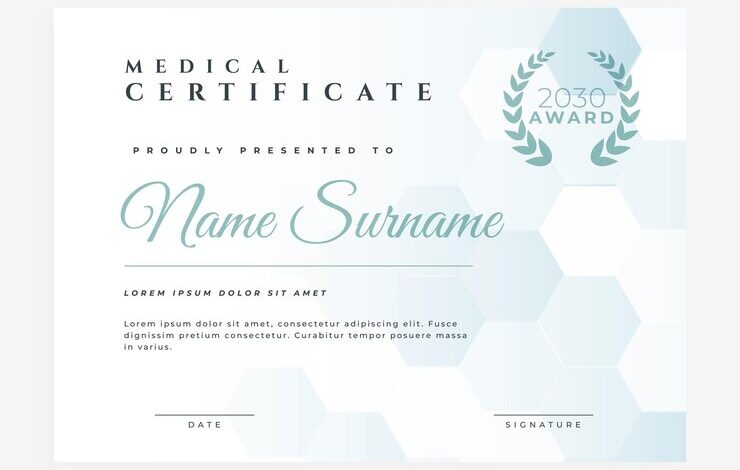What You Need to Know About Medical Fitness Certificate

A medical fitness certificate is more than just a piece of paper—it’s an essential document that verifies an individual’s health and fitness to undertake certain tasks, roles, or activities. Whether you’re applying for a new job, participating in a professional sport, or planning to travel abroad, a medical fitness certificate plays a crucial role in ensuring both individual and public health.
This post will guide you through everything you need to know about medical fitness certificate, including their purpose, the process of obtaining one, the common tests involved, and their significance in modern life. Let’s get started!
What Is a Medical Fitness Certificate and Why Is It Important?
A medical fitness certificate is an official document issued by a licensed healthcare provider that confirms whether an individual is medically fit to perform specific activities or roles. This certificate is often required for legal, employment, or safety purposes.
Why does it matter?
- For Employment
Many jobs, especially those involving physical labor, travel, or public safety (such as in aviation or law enforcement), require proof of physical and mental fitness to ensure the well-being of the employee and others.
- For Sports
Athletes participating in competitive sports must demonstrate their fitness levels to avoid health risks during intensive physical activities.
- For Travel
Certain countries or immigration offices require a medical fitness certificate to grant visas, especially for applicants traveling from regions with health concerns.
- For Education
Medical fitness certificates are sometimes mandatory for students, especially those participating in sports or residing in dormitories.
This document is a formal assurance of your ability to safely engage in specific activities, thus reducing risks and promoting health.
Eligibility Criteria for Obtaining a Medical Fitness Certificate
The criteria for obtaining a medical fitness certificate depend on its intended purpose. Here’s a breakdown of common categories:
Employment
- Industries like construction, transportation, defense, and healthcare often require employees to provide a medical fitness certificate.
- Criteria typically include general physical health, cardiovascular fitness, and the absence of infectious diseases.
Sports
- Professional athletes are required to undergo rigorous medical exams to ensure they meet the physical demands of their sport.
- Tests may include cardiac screening, musculoskeletal exams, and endurance assessments.
Travel
- When traveling to or from countries with specific health risks, a medical fitness certificate is often required.
- Criteria may include vaccination records and general health status.
Other Scenarios
- Fitness certifications are also required for personal insurance claims, fitness club memberships, and even certain legal matters.
The Process of Obtaining a Medical Fitness Certificate
Wondering how to get a medical fitness certificate? Here’s a step-by-step guide:
- Schedule a Consultation
Start by booking an appointment with a licensed physician or healthcare provider. Specify the purpose of the certificate (e.g., work, travel, sports).
- Provide Medical History
Be ready to share details about your medical history, current medications, allergies, and any existing conditions.
- Undergo Recommended Tests
Depending on the purpose, your doctor may recommend tests like blood work, chest X-rays, vision tests, or stress tests.
- Assessment and Certification
Once all evaluations are complete, your doctor will issue the certificate, either in physical or digital format. This document will include the healthcare provider’s details, signature, and official seal to validate its authenticity.
Common Tests and Assessments in a Medical Fitness Evaluation
A typical medical fitness evaluation involves a combination of physical and mental health assessments. Below are some of the common tests:
- Physical Examination
Includes vital signs (blood pressure, heart rate, etc.), lung function tests, and musculoskeletal evaluations.
- Blood Tests
Checks for underlying health conditions like diabetes, anemia, or infections.
- Vision and Hearing Tests
Important for roles that require precise sensory abilities, such as pilots or machine operators.
- Cardiovascular Assessment
Detects potential heart-related issues, especially essential for physically demanding jobs or sports.
- Mental Health Assessment
Evaluates cognitive and emotional well-being, often required for jobs involving high stress or responsibility.
These assessments are tailored to ensure individuals are fit for the specific tasks they aim to perform.
Preventing Disease Spread and Promoting Public Health

One of the lesser-discussed benefits of medical fitness certificate is their role in disease prevention and public health. Here’s how:
- Screening for Contagious Diseases
Prevents the spread of illnesses (e.g., tuberculosis or COVID-19) in workplaces, schools, or public spaces.
- Promoting Vaccination Compliance
Many certificates require confirmation of vaccinations, encouraging broader immunization within communities.
- Reducing Workplace Risks
Ensures employees are fit to safely perform their duties, reducing on-the-job accidents or injuries.
By maintaining health standards, medical fitness certificates contribute to a healthier and safer world for everyone.
Challenges and Misconceptions Around Medical Fitness Certificates
While valuable, the process of obtaining a medical fitness certificate is not without its challenges and misconceptions. Here are some common issues and how to address them:
- Cost Concerns
Some individuals worry about the cost of medical evaluations. To address this, many organizations or governments subsidize the cost based on specific requirements.
- Privacy Concerns
Applicants may hesitate to share sensitive medical information. Rest assured, healthcare providers adhere to strict confidentiality standards.
- Lack of Awareness
Educational campaigns and resources can help spread awareness.
By debunking these misconceptions, more individuals and organizations can take full advantage of this critical health tool.
The Future of Medical Fitness Certificates
Like every aspect of healthcare, medical fitness certificates are evolving. Here are some potential advancements that could redefine the process:
- Digital Integration
With technologies like telemedicine, applicants can now schedule virtual consultations and submit digital test results for faster certification.
- Wearable Tech and AI
Devices like fitness trackers and AI-powered tools can provide continuous health monitoring, potentially eliminating the need for repetitive tests.
- Blockchain for Authenticity
Blockchain technology could be used to issue tamper-proof digital certificates, making them more secure and easier to verify.
These innovations promise to make the certification process quicker, more convenient, and more reliable.
Why Your Health Should Always Come First
A medical fitness certificate is more than a requirement; it’s a reassurance of your well-being and readiness to take on life’s challenges. Whether you’re climbing the corporate ladder, competing in elite sports, or exploring the world, this document plays an indispensable role in safeguarding your health and the health of others.
For more personalized advice or assistance, consult a trusted healthcare provider today. Your health is worth it!



